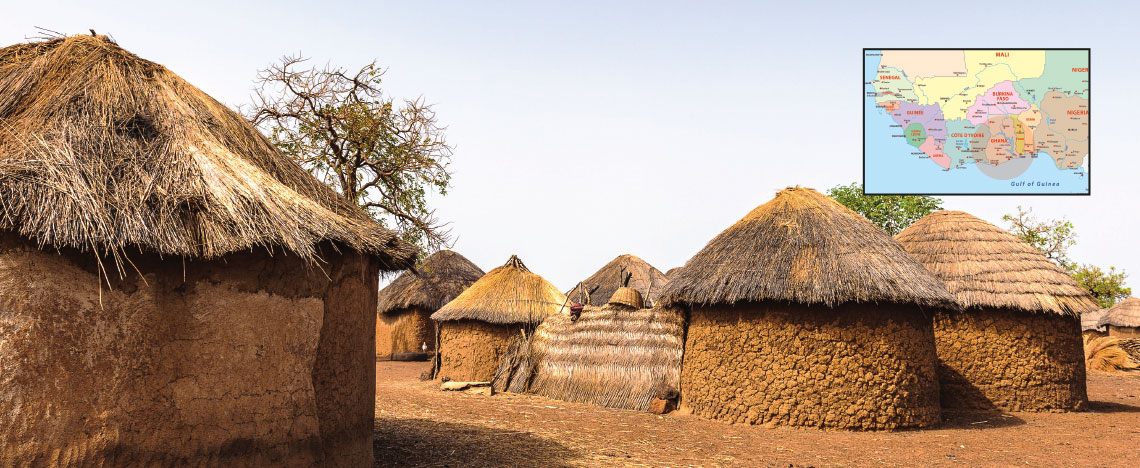On the west coast of Africa, a six hour flight from Johannesburg, in a world where modern day technology and where even less modern inventions, like a post office, are impossible to come by, lies the city of Accra, Ghana. Jewish population: 150. Here, in this small, rural community, in the midst of one of the world’s lesser known third world countries, the Jewish population is slowly growing and thriving. Kosher food may be difficult to come by, but it is not impossible to find. With a bit of ingenuity and creativity, a kosher lifestyle can be found even in the far-flung locations.
The Jewish population of Ghana, mainly Israeli and French businessmen and women, are drawn to Accra because of its low labor and living costs. Here, a job as a contractor, engineer, computer technician, and more are easily found and offer a better pay than in Israel or France. Other resources, such as kosher food, are not as easily accessible as the job market. Up until 2015, the Jewish families within the community were served by bochurim and young shluchim who frequented Ghana for the high holidays, Purim, and Pesach. “Not only was kosher food minimal,” shared an Israeli woman, whose family has been living in Ghana for three years, “food is minimal. The grocery stores here have a policy: They will not restock on basics—flour, eggs, sugar—until the entire store has emptied out.” For many years, the community struggled to keep the kosher spark alive, resorting to a vegetarian lifestyle. That is, until Rabbi Noach and Alti Majesky and their three children arrived on the scene.
The Majeskys moved to Ghana during the summer of 2015 and went straight to work to provide a sustainable kosher atmosphere for the dozens of families that had made Accra their home. Not only were they shocked by the lack of food in town, but by the sheer depravity of the community as a whole. “There are no post offices here. Our homes don’t have addresses. We can’t have food shipped from Johannesburg to Accra. If we want food, someone has to bring it to us in a suitcase.” Kashrus in Ghana is no easy feat, but it is one that the Majeskys tend to with pride. Rabbi Majesky schechts imported chickens, which is the main source of protein. Meat and dairy products are a treat reserved for special occasions and holidays. The Majeskys rely on visitors and businessmen arriving from South Africa or Israel for the bulk of their food. Travelers and tourists are sparse in Ghana, as the country itself is not a hotspot or tourist destination, but sometimes, they get lucky.
Chabad of Ghana currently serves the local Jewish community with a Hebrew School, weekly Shabbat dinners, holiday events, weekly Torah classes, and much more. When it comes to dishing up the meals for each event, Mrs. Majesky has her hands full. “When we first moved here from Crown Heights, I almost forgot that I couldn’t just walk down the street to the bakery to buy a box of cookies. If we want anything, we have to make it ourselves from scratch with whatever we have on hand.” Once the food has been procured, the next challenge comes in storing it. Blackouts are fairly common in Ghana, often times occurring once a day. Many of the families have equipped their homes with generators, but still; some days, all they can do is pray that the food won’t spoil until the electricity returns.
Holidays in Ghana are something to behold. Every holiday was celebrated at the Chabad House this year, with an array of dishes and treats ranging from four course meals for Rosh Hashana, to homemade latkes and doughnuts on Chanukah. Even Pesach, a holiday that often proves to be tricky in the easiest kosher accessible cities, was done in style. Friends and family arrived from around the world to help the Majeskys prepare, bringing over ten suitcases worth of food in tow. The preparations for each holiday begin well over two weeks in advance, with food being prepared and stored in the Chabad House freezer, which luckily stayed cold until Passover! This year’s seder fed close to one hundred people of varying backgrounds and affiliations—one big happy, well fed Jewish family.
Regardless of the extra effort kosher food requires, many feel that kashrus in Ghana itself is much less difficult than they expected, especially considering where they are on the map. “There are no playgrounds, no gyms; it’s so hot that we spend most of our time in school or outside,” Mrs. Majesky shared. “Because we can’t spend much time outside, we spend most of the day in the kitchen. I think we’re better fed and healthier here than we would be anywhere else.”







